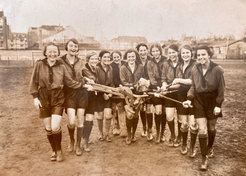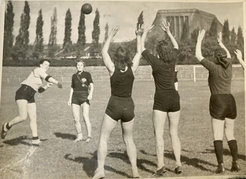Moved. Emotions in Sport
Helen Ahner
Why is it that the victory of the right soccer team can preserve family peace, that cracking your personal record on your daily jog can lead to total euphoria, that the mourning of a deceased sports hero can put an entire country in a state of exception, and that the lack of sport opportunities during a pandemic is perceived as a threat to the mental health of a whole society? This project explores the multiple connections between feeling and exercising, and investigates how the relationship between emotions and sport has developed and taken shape over the last 100 years. This relationship has many facets, and their discovery and analysis have thus far remained a desideratum in the history of emotions and sports alike; the project aims to address this.
In order to do so, it primarily focuses on female* athletes, as their emotional inner lives as well as their emotional performances have been under particular scrutiny and debate. The project explores sport emotions as key experiences for becoming “modern” subjects: The innovative combination of emotion, sport, gender, and body history, and the use of the methodological toolbox of historical ethnography, will contribute to a novel perspective on the cultivated, trained, and evaluated feeling body as a resource for self-fashioning and of sociality. Analyzing archival materials such as organizational documents of sport clubs and ego-documents, but also press products, photography, and literature in combination with oral history interviews and present-day participant observation informs how emotions have been and are being tapped as resources not only for athletic performance but also for self-empowerment and social change. For methodological reasons, the project focuses mainly on Germany, although of course it also takes into account the global networks and relations German athletes were and are engaged in.
First findings revolve around the history of female ambition in sport: While in the 1920s, the first heyday of women’s sport, ambition was deemed “unwomanly,” even dangerous to the physical and mental health of female athletes, today ambition is often seen as a particularly female emotion—yet faces misogynist as well as feminist criticism. Think, for instance, of the social media phenomenon #thatgirl, a recently trending and much-criticized hashtag for content about daily sport and health routines designed in the spirit of self-optimization. Exploring the making, becoming, and (re-)interpreting of the emotion of female ambition in sport since the 1920s will be a first step toward a better understanding of the important role sport emotions play for conviviality, self-fulfillment, and subjectification.



